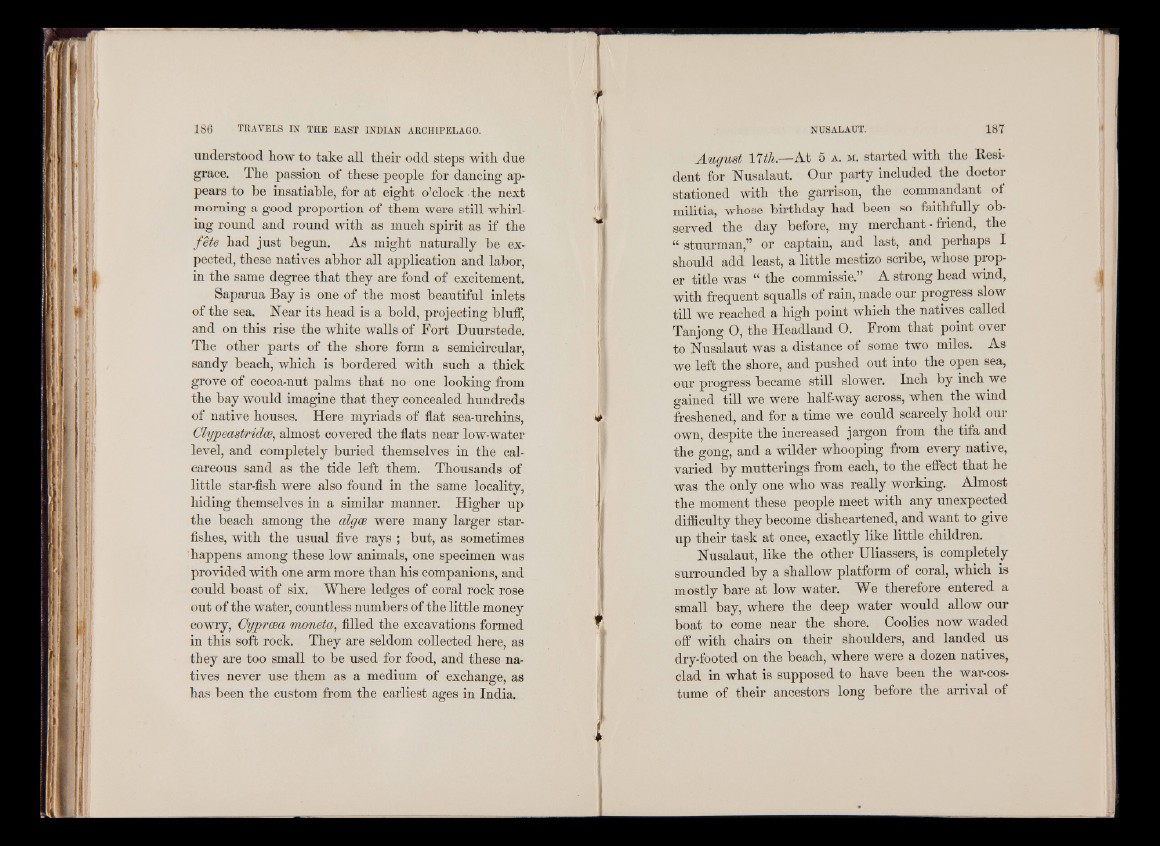
understood how to take all their odd steps with due
grace. The passion of these people for dancing appears
to he insatiable, for at eight o’clock the next
morning a good proportion of them were still whirling
round and round with as much spirit as if the
fête had just begun. As might naturally be expected,
these natives abhor all application and labor,
in the same degree that they are fond of excitement.
Saparua Bay is one of the most beautiful inlets
of the sea. Near its head is a bold, projecting bluff,
and on this rise the white walls of Fort Duurstede.
The other parts of the shore form a semicircular,
sandy beach, which is bordered with such a thick
grove of cocoa-nut palms that no one looking from
the bay would imagine that they concealed hundreds
of native houses. Here myriads of flat sea-urchins,
Olypeastridoe, almost covered the flats near low-water
level, and completely buried themselves in the calcareous
sand as the tide left them. Thousands of
little star-fish were also found in the same locality,
hiding themselves in a similar manner. Higher up
the beach among the algoe were many larger starfishes,
with the usual five rays ; but, as sometimes
happens among these low animals, one specimen was
provided with one arm more than his companions, and
could boast of six. Where ledges of coral rock rose
out of the water, countless numbers of the little money
cowry, Cyproea moneta, filled the excavations formed
in this soft rock. They are seldom collected here, as
they are too small to be used for food, and these natives
never use them as a medium of exchange, as
has been the custom from the earliest ages in India.
August Vlth.—At 5 a . m. started with the Resident
for Nusalaut. Our party included the doctor
stationed with the garrison, the commandant of
militia, whose birthday had been so faithfully observed
the day before, my merchant - friend, the
u stuurman,” or captain, and last, and perhaps I
should add least, a little mestizo scribe, whose proper
title was “ the commissie.” A strong head wind,
with frequent squalls of rain, made our progress slow
till we reached a high point which the natives called
Tanjong O, the Headland O. From that point over
to Nusalaut was a distance of some two miles. As
we left the shore, and pushed out into the open sea,
our progress became still slower. Inch by inch we
gained till we were half-way across, when the wind
freshened, and for a time we could scarcely hold our
own, despite the increased jargon from the tifa and
the gong, and a wilder whooping from every native,
varied by mutterings from each, to the effect that he
was the only one who was really working. Almost
the moment these people meet with any unexpected
difficulty they become disheartened, and want to give
up their task at once, exactly like little children.
Nusalaut, like the other Uliassers, is completely
surrounded by a shallow platform of coral, which is
mostly bare at low water. We therefore entered a
small bay, where the deep water would allow our
boat to come near the shore. Coolies now waded
off with chairs on their shoulders, and landed us
dry-footed on the beach, where were a dozen natives,
clad in what is supposed to have been the war-costume
of their ancestors long before the arrival of